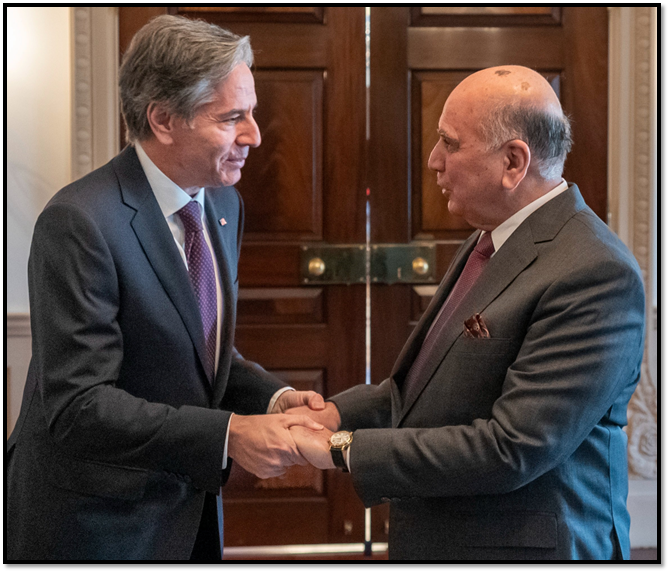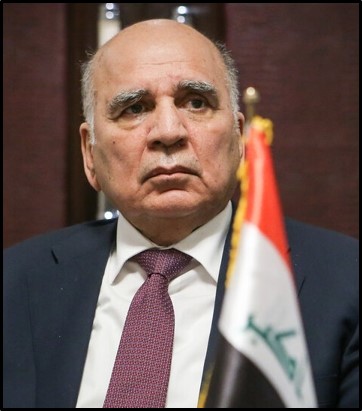During a visit to Washington, Iraqi Foreign Minister Fuad Hussein acknowledged that Iran had influence with political parties, even though the government led by Prime Minister Mohammed Shia Sudani was willing to tell its Iranian counterparts that some of Tehran’s actions were “unacceptable.” Iran has emerged as the most influential foreign player in Iraq since U.S.-led forces toppled Saddam Hussein’s regime in 2003. Iran has taken advantage of deep cultural and religious ties—and a 900-mile border—to permeate Iraq’s political, security, economic, and religious spheres.

Hussein rejected claims that Iran has undue influence in Iraq. Decision-making on all foreign and domestic policies “must be taken by Iraqis—and inside Iraq,” he said at the Woodrow Wilson Center on February 13. But he conceded that his own oil-rich country was dependent on Iranian imports to provide energy and electricity for many of its 43 million people. Baghdad is also dependent on U.S. aid and military advice to counter covert operations by ISIS, which held a third of Iraqi territory between 2014 and 2017. Since the collapse of the caliphate, ISIS cells have launched assassinations, bombings and kidnappings to undermine the government. In 2022, Washington also allocated more than $440 million in financial aid.
Since 2003, Iran has campaigned to force the U.S. withdrawal from Iraq and other Middle East countries. U.S. officials claim that hundreds of Americans have been killed in attacks by Iraqi militias under the direct command or indirect influence of Iran. Hussein, a Kurdish politician and former finance minister, urged the United States and Iran to engage in dialogue to revive the 2015 nuclear deal, a process that deadlocked in August 2022. “We hope that once again start talks in Vienna,” he said at one of several public appearances while in Washington to meet with senior U.S. officials. The following are excerpted remarks by Hussein on Iran from his trip to Washington.
On Baghdad’s relations with Tehran

At the Woodrow Wilson Center on Feb. 13, 2023: “The Iranian officials and the Iraqi officials, when they discuss with each other… they’re expressing their views from their own interests. When the Iranians are discussing matters with us, it has to do with their own interests. It has to do with their own policy. When they discuss with us, let’s say the relationship with the West—in this case with the United States—of course their point of view is different than ours. But we are telling them this is your interest, but our interests ask us to do something else.”
“We have common areas, but we have got also differences. Common areas have to do with mutual interest—economic ties, cultural ties, being neighbors, security in the area, oil prices.”
“But there are some differences, especially in foreign policy. Of course, their position is well known—it’s different than ours. …When we agree together, it is about policy of both countries. When we don’t agree and differ on some issues… we are telling them that that’s not possible because that’s against Iraqi interests. And I must say nowadays, they respect what we say.”
“We are paying the price because now we are depending on others. We are buying gas and electricity from Iran for $4 billion annually. Imagine if we had our own gas, then we had our own electricity, then we were not paying, then we were benefiting. I blame nobody else except ourselves.”
On Iraqi foreign relations
In remarks at the Wilson Center on Feb. 13, 2023: “This interaction between internal politics in Iraq and external—in this case, regional politics—obliges us to have good relationships with neighboring countries and also… to build bridges between some of these countries who are in conflict with each other. And that’s why we started—and we took the initiative—to build bridges between the Saudis and the Iranians.”
“We were [supporting regional talks] and we will continue that—first, for the interests of Iraq. Second, for the interests of the region. Because if we can cooperate, we can develop our economy. We are always thinking about an alternative when there are conflicts. We never think about going to war again. We know the results. We studied the history. Dialogue is the way to solve problems. Peaceful means is the way to solve the problems.
“We are not threatening any other countries. Sometimes, others are threatening us, creating problem for us—and we are still going to them. When they create problems for us, we approach them. When they create problem for us, we say, ‘Let’s talk.’ We don't have an alternative except to talks.”
“We build good relationships with all neighboring countries. We are also balancing relationships. We have good ties with Tehran and with Ankara. But we also have good ties with Jordan and Egypt. During the last two, three years, our relationship with the Saudis is excellent. That’s also valid for all other Gulf countries.”
In remarks at the U.S. Institute of Peace on Feb. 10, 2023: “We want to have good ties and we have good ties with [different countries]. But that doesn't mean when we have good ties and cooperation with these countries, it will be used—or we will be used—against others. We are aware of the tension between Washington and Iran, but we have very strong relations with both.”
“We are frank with the Iranians. We are telling them about our good and historical relations with the United States. And we are telling them that our country, Iraq--the society, politics, economy—is in need [of relations with the United States]. In fact, we are telling both sides that the tension between both countries is not good… for us. Sometimes we are encouraging both sides to continue dialogue, to continue negotiation. We were happy about the process of the negotiation in Vienna [on reviving the 2015 nuclear deal], and we hope that once again they will start talks in Vienna.”
On foreign influence in Iraq
In remarks at the Wilson Center on Feb. 13, 2023: “It is a fact that we have political parties inside Iraq ideologically, or they have sympathy with the political system [of Iran]. This is normal when you have ideological ties. Some people, they are liberals. They’ve got ideological ties with liberal people in the West. Some people are communists. They have got ideological ties with China now.
“The decision-making must be in Iraqi hands about Iraq. Decisions on all fields must be taken by Iraqis and inside Iraq.
“We are frank with the Iranian side. When there are some issues, usually we go to Tehran and we tell them, ‘This is not acceptable.’ We can cooperate. We can be good neighbors. But we are not an attachment of any other country, including neighboring countries.
“Iraqis must have their decisions in their hands. … But interaction between these countries will be there…That interaction is different than others [making a] decision for you. So the decision-making process gradually will be in the hands of the Iraqis about all these strategical issues.”
Photo Credit: Hussein via Mehr News CC BY 4.0
